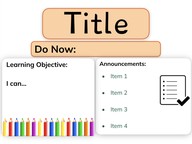
Practice showing not telling
I can "show" and not simply "tell" to bring a scene or character to life.



8,000 schools use Gynzy
92,000 teachers use Gynzy
1,600,000 students use Gynzy
General
In this lesson, students will learn some ways to show characters' emotions and emotions, instead of just telling. They will read examples and discuss the differences between the two ways. They will also write their own passages to convey what happened in a story.
Standards
CCSS.ELA-Literacy.W.6.3b
CCSS.ELA-Literacy.W.7.3b
CCSS.ELA-Literacy.W.8.3b
Learning objective
Students will be able to "show" and not simply "tell" so that they can bring a scene or character to life in my writing.
Introduction
Discuss the concepts of setting and interesting characters, and why they are essential to creating a good story. Students will read two sentences describing a picture and name the setting. They will also look at a different picture with a description and name the characters.
Explain why it is important to show, not just tell, the reader what we want them to know.
Instruction
Students will read two examples of the same story about Marianna and her sister. One will tell what happened, while the other will show what happened. Students will discuss the differences they noticed between the two passages.
Next, students will practice showing emotion. How might they show a character is sad? They will practice coming up with ways to show different emotions, as well as different settings.
Quiz
Students will respond to 10 questions that check their knowledge of key concepts taught in the lesson.
Closing
Students will recall:
- What happens to our writing when we show instead of tell?
- Will showing in my writing allow me to be more creative?
The online teaching platform for interactive whiteboards and displays in schools
Save time building lessons
Manage the classroom more efficiently
Increase student engagement
Discover more!
About Gynzy
Gynzy is an online teaching platform for interactive whiteboards and displays in schools.
With a focus on elementary education, Gynzy’s Whiteboard, digital tools, and activities make it easy for teachers to save time building lessons, increase student engagement, and make classroom management more efficient.



